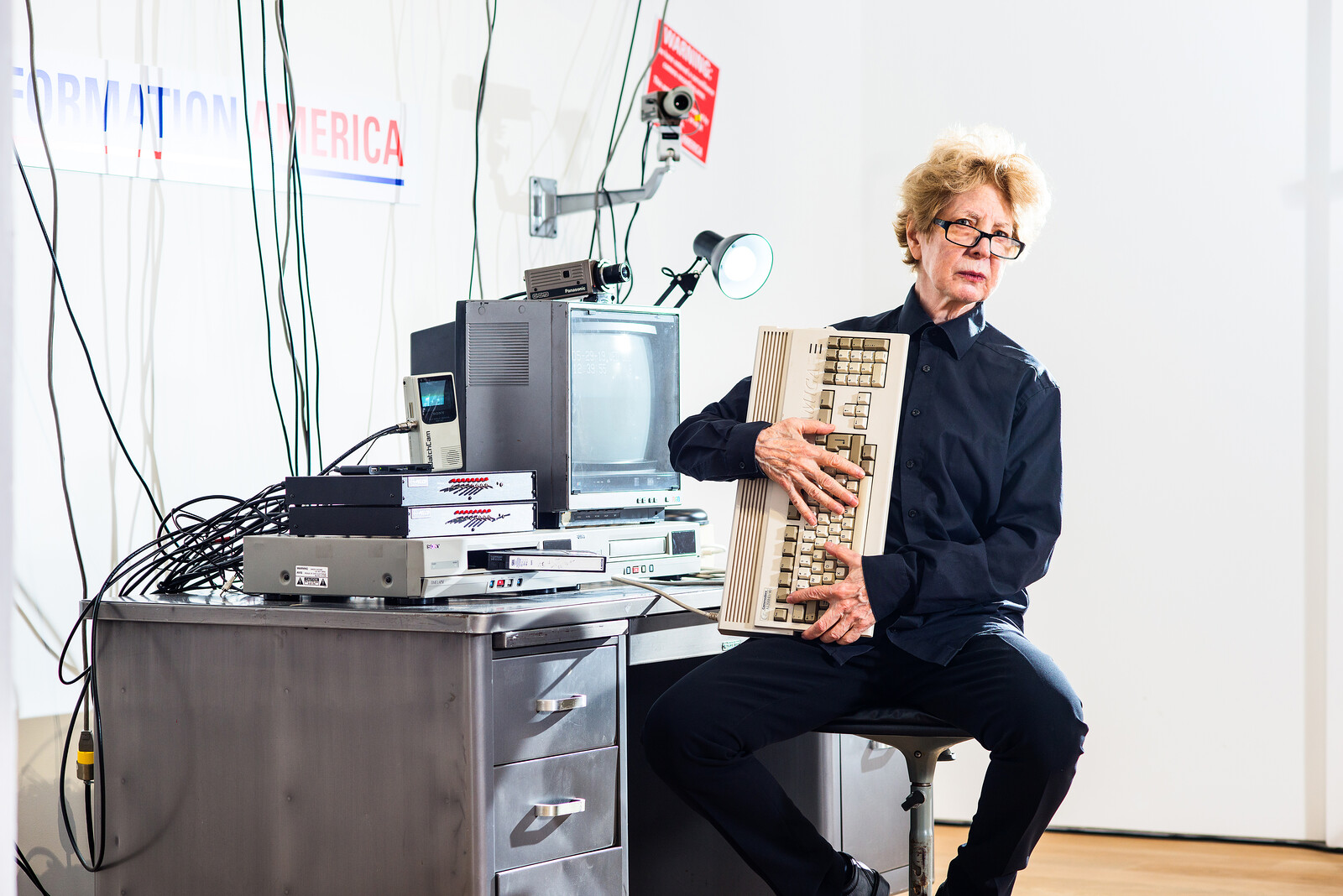Maximum Security Society
March 26–August 20, 2023
Abteistraße 27 / Johannes-Cladders-Platz
41061 Mönchengladbach
Germany
Hours: Tuesday–Friday 11am–5pm,
Saturday–Sunday 11am–6pm
T +49 2161 252637
mail@museum-abteiberg.de
The American artist Julia Scher (b. 1954 in Hollywood, California) was among the first to recognize the power of digital media and the surveillance society phenomenon it has perfected. She to some extent anticipated our present by installing camera and audio surveillance technology in art spaces in the 1990s, demonstrating the mechanisms of control, power, manipulation, and pacification. The combined live switching of these devices, Scher’s off-screen voice emanating from audio systems, staging, even the involvement of institutional security personnel resulted in manipulative situations that suggested to the audience of an art exhibition that they were being watched and controlled. The artist has engaged with these topics since the late 1980s—long before the advent of television formats such as Big Brother or films like The Truman Show. With foresight her practice explored the trajectory of contemporary society, where constant collection of personal data has become the norm.
Scher creates evocative, seer-like spaces, live surveillance situations that range from early digital control mechanisms with cameras and monitors to the complex data tapping and listening systems in smartphones, Siri, or Alexa. Scher’s work shows the “surveillance and punishment” (Michel Foucault), the clash between desire and control in the reality of what sociologist Gary T. Marx describes as the “maximum security society”: a society that relishes these technologies while simultaneously tolerating and accepting a loss of control and the commodification of personal data.
About the exhibition
Museum Abteiberg presents an essayistic survey of Julia Scher’s practice from its beginnings to the present. A number of key spaces—among them, the live camera installation Predictive Engineering, a work the artist first presented at the San Francisco Museum of Modern Art in 1993 and has since re-produced for the exhibition at Museum Abteiberg; the early digital workshop assemblage American Fibroids (1996/2022); the installation Wonderland, a children’s safety center first exhibited at the MCA Chicago in 1997; Embedded with Mama Bed, Papa Bed and Baby Bed (2003) from the Surveillance Beds series; the audio space Delta (Radio) and Planet Greyhound from her most recent body of work (produced with Kunsthalle Gießen, 2022). In addition to the very early computer installations Danger Dirty Data. I’ll Be Gentle and Schürmann Haus (1991), visitors will also be able to see the prehistory of her current society-focused practice, including her start in landscape painting and photography, but also the nearly 4-hour Discipline Masters, a key autobiographical video from 1988.
The exhibition presents a multimedia oeuvre that includes painting, sculpture, video, audio, performance, and art projects spanning clubs and the Internet—all born out of contemporary changes and a digital realm where identity is no longer defined by the individual human being, but by data. Scher’s art has been a touchstone of art and media critical discourse since the 1990s. It is also ripe for discovery by a wider audience.
A comprehensive publication on the work of Julia Scher, initiated by Kunsthalle Gießen and DISTANZ Verlag, realized in collaboration with Museum Abteiberg, MAMCO Geneva and Kunsthalle Zürich, is scheduled for release in June 2023. Edited by Nadia Ismail and Matthias Kliefoth, it features extensive photographic documentation as well as new essay by Katrin Kämpf and Lilian Haberer, Gesine Borcherdt, Magnus Schaefer, Mark von Schlegell, and Gloria Sutton. German/English, 368 pages, hardcover, ISBN 978-3-95476-488-4, 48 EUR.
Other dates and information
Dates for the book launch and further exhibition programming will be announced shortly.
The exhibition at Museum Abteiberg is curated by Susanne Titz and Gian Marco Hölk.
The exhibition is being realized in cooperation with Kunsthalle Zürich and was made possible with support from the Ministry of Culture and Science of North Rhine-Westphalia, Kunststiftung NRW, the Hans Fries Foundation, and Museumsverein Abteiberg.


